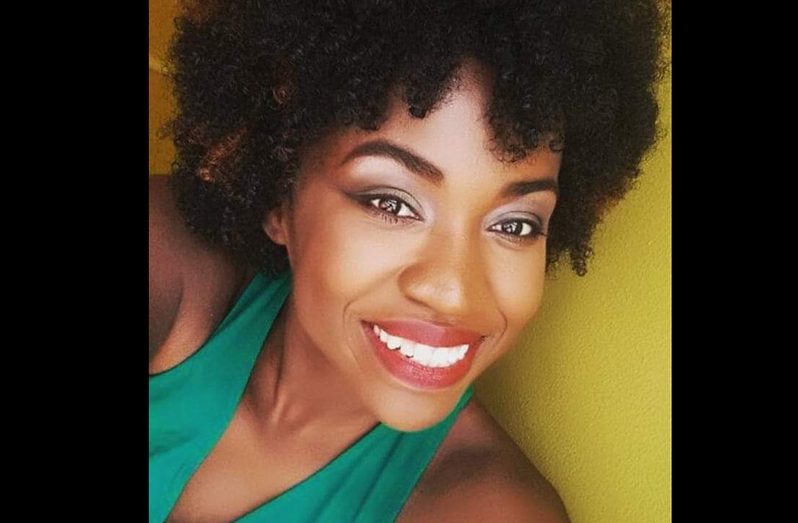–founds ‘Ella Caribbean’, a support group for mothers with the same disorder
A YOUNG Guyanese mother who battled and conquered postpartum depression has started a Caribbean network organisation to foster support for mothers in the Caribbean region who may have difficulty overcoming ‘the baby blues’.
Twenty-six-year-old Amarcia Clarke shared her remarkable story with the Guyana Chronicle, telling of how she intends to use it and her newly-founded organisation to be a pillar of strength to mothers.
Clarke, who graduated in 2017 from the University of the Southern Caribbean with a BSc in Psychology, defines postpartum depression as a mood disorder, where mothers experience feelings of extreme fatigue, sadness, and anxiety.
“These feelings will eventually prevent or make it difficult for them to take care of the baby, do household chores, or even taking care of themselves,” Clarke said. “Symptoms can range from mild to severe, and in some cases, it can be severe enough to put the mother and baby’s health at risk. Postpartum depression can go on for years if left untreated.”
Further research, she said, suggests that the condition is caused by a combination of environmental and genetic factors.
“An example of environmental factors will be a lack of support from your loved ones,” she said, adding: “Another is feeling pressured to return to your pre-pregnancy body, which can be quite overwhelming. This can then lead you to turn against the baby, blaming him or her for your new extra skin. An example of a genetic factor is having a predisposition to depression and anxiety before falling pregnant, which is in my case.”
As the young mother went on to explain, “Pregnancy can trigger your depression or anxiety that you once had under control.” Delving deep into her personal experience, Clarke said that having a baby was never in her vocabulary to begin with.
“Not that I don’t love babies,” she said. “I always love babies; just that I thought they were never for me. One reason I thought they were never for me was that I knew I had an anxiety and depression issue. Also, I enjoyed the path I was on career-wise. Some may ask, ‘So why did you choose to make a baby?’ Well, the last thing I was told by my doctors is that I can’t make a baby, which was good; after all, I was never interested. After finding out I was pregnant, I was so anxious, my what-if questions started the moment the test read positive. My questions included, ‘What if I don’t know how to be a good mom? What if I can never get back on track with my career? What if I harm him because of my history with self-harm?’ My mind never stopped with the worrying and the thinking, and being scared of the thoughts I was thinking. Like if the what-if questions were not enough, I had the most traumatising birth ever,” Clarke narrated.
TRAUMATIC DELIVERY
She said that her delivery was accomplished with the aid of forceps, which turned out to be an excruciating experience.
As she recalled: “I was not supposed to even give birth the time I did. I went to the clinic and was admitted because of some mixed-up reason that I don’t even understand to this day. When I got admitted, I was told I needed blood. I collected the blood, which paralysed the left side of my body for a few hours, and in the process of collecting the blood, the inducement started. To deliver, it took a second-degree tear, an episiotomy, and forceps. I thought to myself, ‘Am I even going to be allowed to urinate normally again?’ By now, you should know the type of birth will also decide if you will trouble from postpartum depression.”
Clarke said that by this time, she was in a very dark, lonely place, and that was not the end of the painful birth process.
“After I was discharged from the hospital, four days later, I was hospitalised again! My gosh! Pregnancy was not for me! Thankfully, my mother and partner were with me all the way. While I was hospitalised, my baby was home with his grandmother and father. For the first few weeks of his life, I was not there. I tried to ‘pump’ at the hospital and send breast milk for him; it was really painful. At this moment, I still had no idea what I was experiencing. I thought it was normal depression and anxiety kicking in.
SCARY THOUGHTS
“After I got discharged for the second time and joined my baby at home, my mother pushed for me to start breastfeeding. During breastfeeding, I started to have these negative thoughts; I was exhausted and really tired. On some occasions, the thoughts were even directed towards my baby. I thought he was so unfair; I was like, ‘Hey dude! I just returned from being half-way dead! I need time to heal, and here you are sucking the life out of me!’ Sometimes I was so angry that I wanted to throw him away. On some occasions, I even thought of putting him up for adoption. I think my mother realised what was going on after a time; she decided to keep the baby away from me, and only bring him when it’s time to feed. Back then, she would even stay around me while I was with him. After she left at five months, my partner stepped in. When he comes from work, he will have dinner and prepare for bed early, and wake up at 12 am to be with the baby, and bottle-feed him while I sleep,” Clarked shared.
She said that she battled the thoughts for about six months, before she discovered what it was that she was going through.
“At around six months,” she said, “I finally found out what I was going through by researching and returning to my text-book from university. That’s when I thought it’s time to at least attempt to control this new depression. So I began my research. During my research, I found out I was transferring my negative emotions to my baby via breastfeeding. So I quit breastfeeding, with the help of my partner and the support of my mom, because they both realised it was doing more bad than good. Secondly, I found out babies do well with routine; coincidentally, I also do well with routine. I drafted a routine for both the baby and me, which also included his father. This routine included meal prepping every Sunday, and laying out our activities for the week. By the time his six months ended, he was sleeping through the night, and this mama was finally finding time to sleep, bathe, and do her hair.”
THE BREAKTHROUGH
Following through with her coordinated routine with her family support system, Clarke eventually pulled through the phase of harmful thinking towards herself and baby.
She said that from her knowledge and research, there are no preventative measures that can be taken against postpartum depression, since there is no definite way of knowing how a woman’s body will respond to childbirth.
“I believe research also backs up my claim, because I was like an owl on the Internet, and in books searching for preventative measures but failed in finding any. What I did come across are a few things a woman and her family can do during pregnancy that will lessen her chances of postpartum depression and anxiety, or may even reduce the symptoms. These things include nourishment, exercise, adequate sleep, support, understanding and awareness, and stress reduction,” she said.
Because of her experience with this depression common among young mothers, Clarke decided to create a Caribbean network organisation for mothers, which she named, ‘Ella Caribbean’.
She said that she met a mother who went through a similar experience, but that mother went as far and burning her child.
Clarke said: “The mother explained that with the help of her husband, she found out what was happening to her and decided to seek help from her pastor at church, which was one of the reasons her baby was never taken away. Both the pastor and her husband vouched for her. And I thought to myself, ‘What happens to all the other mothers who do not have anyone to vouch for them, or even the mothers who do not understand what they are going through?’ So I decided right there and then that I can be the one to vouch for them. But I thought I needed to complete my Master’s first.
However, a few weeks ago, I said to myself, ‘I don’t need my Master’s to start helping other mothers with similar experiences like myself; I can do so by sharing my experience and the experience of others to bring awareness to the issue.’ I thought that I can also do so by sharing encouragement in simple quotes, and I’m positive it will reach someone that’s in need of help.
‘ELLA’ TO THE RESCUE
So ELLA was born. The name Ella stands for goddess and beautiful in Hebrew. What a beautiful way to describe mothers! Right? Caribbean was added because I hope to cover the entire region in the near future.”
She further detailed that Ella Caribbean aim is to let mothers know they are stronger together.
“Since ‘Ella Caribbean’ is still at the newborn stage, I can just list a few objectives that are currently on paper. These include: To create an atmosphere where mothers can freely describe their emotions without being judged, to be able to help mothers get back on track by creating a routine for both the babies and mothers that suit their schedules, to be able to lend emotional support and to be able to prove that we can have the best of both worlds, career, and a baby or babies. As we grow, I know we will have more exciting things in the future. With this being said, I hope that ‘Ella Caribbean’ proves to society that despite a mother may have negative feelings towards her baby, it doesn’t mean that she hates her baby,” Clarke said.












